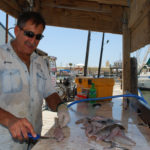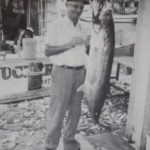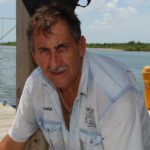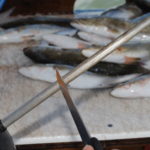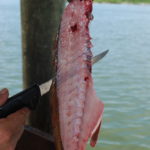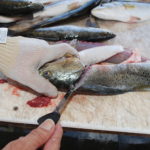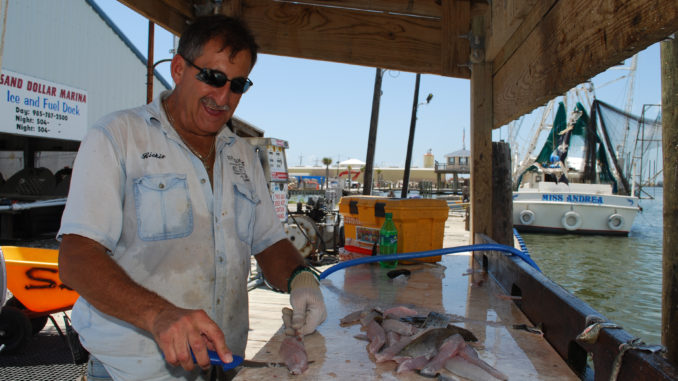
If you think you’re really good at filleting fish, don’t stand next to Ricky Richoux at the cleaning table.
The rugged man flipped a business card to the fishermen at the International Grand Isle Tarpon Rodeo. It displayed a bowie knife in its center and read Slimeslingers Professional Fish Cleaning: Willing to Travel.
Right down to the ice-water blue eyes and manicured moustache, Ricky Richoux was a ringer for Richard Boone, the sophisticated but testosterone-oozing gunslinger who played Paladin on the six-year television western, Have Gun, Will Travel.
Watching the 52-year-old Grand Islander work at a marina cleaning station is an experience. Listening to him chatting with his customers, observers and questioners is both enlightening and entertaining.
While he chops on the pile of speckled trout in front of him, he tosses handfuls of backbones and skin into the water. He has a lot of helpers to dispose of the discards. Laughing gulls, which he calls “flying rats,” screech as they dive on the offal. He humorously notes that “New York has crawling rats; we have flying rats.”
Beneath the water, swarms of mullet and hardhead catfish, which he calls “Cajun piranha,” dispose of what the gulls don’t get.
He gives credit for his career as a professional knife to John Bradberry, whose main job was as a boat operator for the Louisiana Department of Wildlife and Fisheries. Bradberry was for many years known as the guy who cleaned up the fish for display at the Grand Isle Tarpon Rodeo and in the evenings the rest of the year would clean fish for tourists at Cheramie’s dock.
“Everybody knew Papa John,” he said. “He cleaned fish to help raise his 17 kids.
“In 1973 and 74, back when fuel was a quarter a gallon, I was a charterboat deckhand and I cleaned fish at Raoul’s. I worked for tips and made extra money cleaning fish. Bradberry would come and watch me and criticize.
“Finally, one day I said, ‘show me.’ He said ‘OK’ and he did. It turned into a passion for me. I like to see fish cleaned right. I started calling myself a professional after I realized what I was doing.”
Richoux cleans more trout, both specks and whites, than any other species. The first cut on every trout begins the same way. He turns the fish on its back and with the cutting edge facing the tail, stabs it just beneath the pectoral fin on one side. The blade is then drawn through to the anus, effectively separating the guts, eggs (or testes) and most importantly the tough, white air bladder from the rest of the fish. He explains that this cut also gets the stomach juices of the fish away from the flesh.
Before filleting the fish, he cuts loose the egg sacs and sets them aside, either to give to the customer, or more likely for friends — “old people” in the Grand Isle community.
The vertical cut behind the head is made at an angle to recover as much of the meat as possible from just behind the head.
“My customers know my cut,” he says proudly.
The actual filleting cut is made with smooth, gliding, mini-strokes, the way a virtuoso would play a violin, rather than with a single rip.
He holds up a filleted trout and passes the blade of his knife behind it. It can clearly be seen through the meager meatless rack.
“I pride myself in this,” he says.
Passers-by stop to watch him work and almost invariably engage him in conversation. He picks up some customers this way, but claims that 70 percent of his business is repeat business. A large percentage of his customers are doctors, not because they can afford the service; it’s only 40 cents per pound.
“They can’t afford to cut their fingers,” Richoux says. “It’s a liability to operate with an open wound.
“And who wants to be touched by someone with sores?”
True to his card’s claim, Richoux will travel. He picks up fish to be cleaned from motels and camps, or he meets customers at marinas. He works out of Bridgeside Marina and Sand Dollar Marina, as well as Pirate’s Cove, a private marina.
“Some days on weekends are hurry up and wait; others are busy all day,” he said. “Sometimes it gets so busy that my son Earl and my friend Wilson Bourgeois need to help me.
“I also get calls all during the week. You just never know. When the phone rings, I jump and run.”
With a mischievous grin, he explains the name Slimeslinger.
“I was working at a table that faced away from the water. While I was cleaning the fish, the knife slipped through a fish and slime and guts hit a woman nearby.
“She looked down at the mess and said, ‘You slung slime on me.’ I apologized, but did mention that it is a fish-cleaning station after all.
“One of my buddies standing there said, ‘That would be a good name for you.’ The name stuck. I was 15 then. There were a group of us that cleaned fish together, so that is the reason for the plural. But they have faded away and I am still here.”
Ricky Richoux can be reached at (504) 415-0039.
